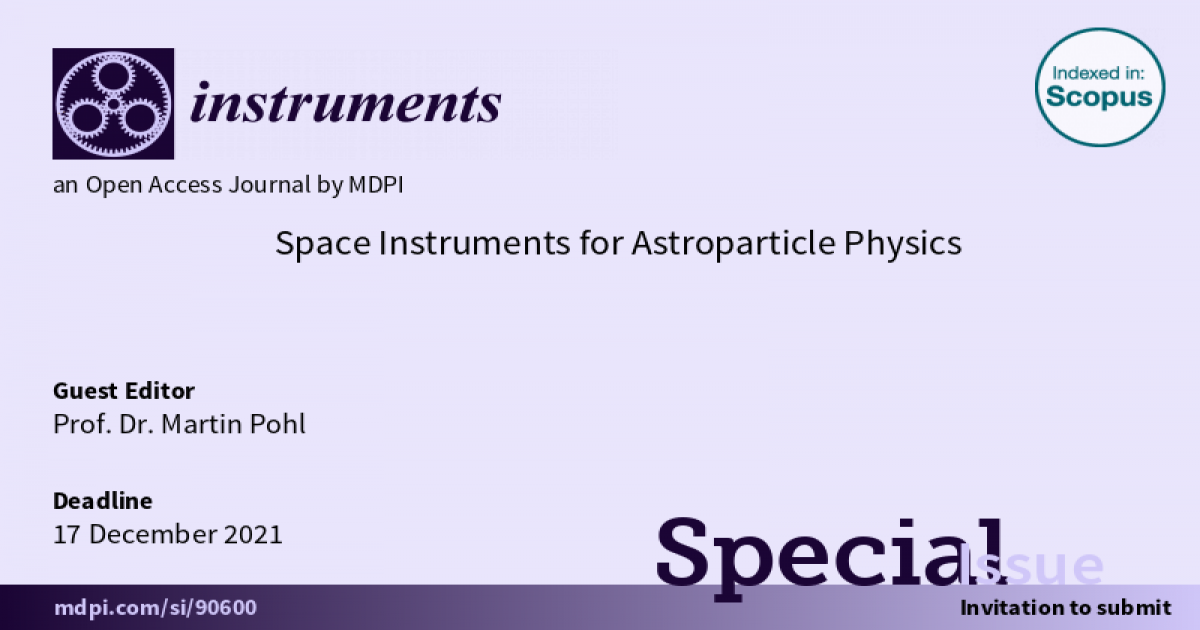Space Instruments for Astroparticle Physics
A special issue of Instruments (ISSN 2410-390X).
Deadline for manuscript submissions: closed (1 December 2022) | Viewed by 6651

Special Issue Editor
Interests: particle detection and space technology
Special Issues, Collections and Topics in MDPI journals
Special Issue Information
Dear Colleagues,
It is our pleasure to announce this Special Issue devoted to instruments for astroparticle detectors. The focus will be on state-of-the-art instruments which meet the challenges of operation in space. We especially invite you to contribute papers on the following subjects:
- New ideas for space astroparticle detectors
- Calorimeters and spectrometers for space applications
- Particle identification subsystems, instruments, and algorithms
- Electronics amenable to space conditions
- Subsystems to control environmental parameters
- Simulation results for novel instruments
- Calibration methods and results
- Inflight calibration and performance
This is an excellent opportunity to get your new ideas on the map (and establish intellectual property at the same time), for selected contributed papers. Material from white papers can of course be used, if at peer-reviewable level. Invited articles will exceptionally be published free of charge. Waivers for open access publication fees can also be considered upon request.
Moreover, Instruments journal has no restrictions on the length of manuscripts, provided that the text is concise and comprehensive. For review or article papers, we just suggest that the word count in text are not more than 12,000. For communication paper, the word count in text are not more than 3,000.
Prof. Dr. Martin Pohl
Guest Editor
Manuscript Submission Information
Manuscripts should be submitted online at www.mdpi.com by registering and logging in to this website. Once you are registered, click here to go to the submission form. Manuscripts can be submitted until the deadline. All submissions that pass pre-check are peer-reviewed. Accepted papers will be published continuously in the journal (as soon as accepted) and will be listed together on the special issue website. Research articles, review articles as well as short communications are invited. For planned papers, a title and short abstract (about 100 words) can be sent to the Editorial Office for announcement on this website.
Submitted manuscripts should not have been published previously, nor be under consideration for publication elsewhere (except conference proceedings papers). All manuscripts are thoroughly refereed through a single-blind peer-review process. A guide for authors and other relevant information for submission of manuscripts is available on the Instructions for Authors page. Instruments is an international peer-reviewed open access quarterly journal published by MDPI.
Please visit the Instructions for Authors page before submitting a manuscript. The Article Processing Charge (APC) for publication in this open access journal is 1400 CHF (Swiss Francs). Submitted papers should be well formatted and use good English. Authors may use MDPI's English editing service prior to publication or during author revisions.
Keywords
- space calorimeters
- space spectrometers
- particle identification instruments
- space electronics
- instrument calibration
- control systems
Benefits of Publishing in a Special Issue
- Ease of navigation: Grouping papers by topic helps scholars navigate broad scope journals more efficiently.
- Greater discoverability: Special Issues support the reach and impact of scientific research. Articles in Special Issues are more discoverable and cited more frequently.
- Expansion of research network: Special Issues facilitate connections among authors, fostering scientific collaborations.
- External promotion: Articles in Special Issues are often promoted through the journal's social media, increasing their visibility.
- e-Book format: Special Issues with more than 10 articles can be published as dedicated e-books, ensuring wide and rapid dissemination.
Further information on MDPI's Special Issue polices can be found here.




